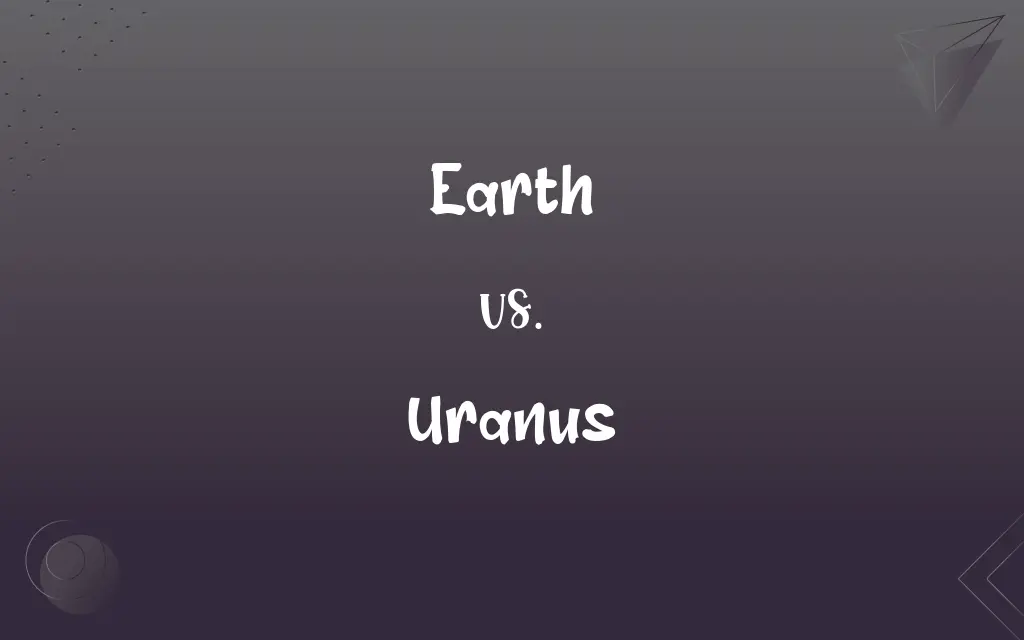Earth vs. Uranus: What's the Difference?
Edited by Aimie Carlson || By Janet White || Published on January 6, 2024
Earth is our home planet, teeming with life and water. Uranus is a distant, gas giant with an extreme tilt and cold temperatures.

Key Differences
Earth is a rocky planet, the third from the Sun, known for its abundant water and life-sustaining atmosphere. In contrast, Uranus is the seventh planet from the Sun, a gas giant primarily composed of hydrogen, helium, and a small amount of methane, giving it a blue color.
Earth's atmosphere, rich in nitrogen and oxygen, is crucial for life and weather systems. Uranus, on the other hand, has an atmosphere composed mainly of hydrogen and helium, with traces of water, ammonia, and methane, lacking the conditions to support Earth-like life.
Earth's rotation axis is tilted at about 23.5 degrees, leading to the changing seasons. Uranus is unique for its extreme axial tilt of about 98 degrees, causing it to orbit the Sun on its side.
Earth has a single moon and no rings. Uranus boasts 27 known moons and a complex ring system, composed of narrow and faint rings mostly made of ice particles.
Earth's geological activity, including plate tectonics and volcanoes, shapes its surface. Uranus, being a gas giant, lacks a solid surface and experiences different types of internal heat-driven activities.
ADVERTISEMENT
Comparison Chart
Type
Rocky Planet
Gas Giant
Orbit
Third from the Sun
Seventh from the Sun
Atmosphere
Nitrogen, Oxygen
Hydrogen, Helium, Methane
Axial Tilt
23.5 Degrees
98 Degrees
Moons/Rings
1 Moon, No Rings
27 Moons, Multiple Rings
ADVERTISEMENT
Earth and Uranus Definitions
Earth
Earth refers to the surface layer of our planet.
The farmer tilled the earth to plant seeds.
Uranus
In astrology, Uranus symbolizes change and innovation.
Her astrological chart showed a strong influence of Uranus.
Earth
Earth can mean worldly as opposed to heavenly.
His thoughts were more on earth than the heavens.
Uranus
In astronomy, Uranus represents a gas giant.
Uranus' composition is vastly different from Earth's.
Earth
Earth is the third planet from the Sun.
The Earth orbits the Sun once every 365 days.
Uranus
Uranus is a planet in our solar system, known for its blue-green color.
Uranus is the seventh planet from the Sun.
Earth
Earth can also mean a large mass of land.
The explorer traveled across the earth to discover new lands.
Uranus
Uranus is named after a deity in Greek mythology.
In mythology, Uranus was the god of the sky.
Earth
In electrical terms, earth is a grounding mechanism.
The electrician ensured the wires were properly earthed.
Uranus
Uranus is sometimes used in cultural references.
The sci-fi novel depicted an advanced civilization on Uranus.
Earth
The land surface of the world.
Uranus
Greek Mythology The earliest supreme god, a personification of the sky, who was the son and consort of Gaea and the father of the Cyclopes and Titans.
Earth
The softer, friable part of land; soil, especially productive soil.
Uranus
The seventh planet from the sun, revolving about it every 84.01 years at a mean distance of approximately 2.9 billion kilometers (1.8 billion miles), having a mean equatorial diameter of 51,118 kilometers (31,763 miles) and a mass 14.6 times that of Earth.
Uranus
The son or husband of Gaia (Earth), and father of Chronos (Time) and the Titans.
Uranus
One of the primary planets. It is about 1,800,000,000 miles from the sun, about 36,000 miles in diameter, and its period of revolution round the sun is nearly 84 of our years.
Uranus
(Greek mythology) god of the heavens; son and husband of Gaea and father of the Titans in ancient mythology
Uranus
A giant planet with a ring of ice particles; 7th from the sun
FAQs
What is Earth's primary atmosphere composed of?
Earth's atmosphere is mainly composed of nitrogen and oxygen.
What causes seasons on Earth?
Earth's seasons are caused by its 23.5-degree axial tilt.
Does Uranus have any moons?
Yes, Uranus has 27 known moons.
How long does it take Earth to orbit the Sun?
Earth takes about 365 days to orbit the Sun.
What is Uranus's axial tilt?
Uranus has an extreme axial tilt of about 98 degrees.
What is Earth's largest ocean?
The Pacific Ocean is Earth's largest.
How many continents does Earth have?
Earth has seven continents.
What is the color of Uranus?
Uranus is predominantly blue-green.
Is Uranus bigger than Earth?
Yes, Uranus is significantly larger than Earth.
Can life exist on Uranus?
Uranus's conditions are not suitable for Earth-like life.
Does Earth have rings?
No, Earth does not have any rings.
What is the temperature on Uranus?
Uranus is extremely cold, with temperatures around -224°C.
How does Uranus rotate?
Uranus rotates on its side due to its tilt.
Does Uranus have a solid surface?
No, Uranus does not have a solid surface.
How was Uranus discovered?
Uranus was discovered by William Herschel in 1781.
What percentage of Earth's surface is water?
About 71% of Earth's surface is covered by water.
What is the most unique feature of Earth?
Earth's most unique feature is its ability to support diverse life forms.
What is Earth's core made of?
Earth's core is primarily iron and nickel.
What is the gravity like on Earth?
Earth's gravity is strong enough to hold atmosphere and oceans.
Is Uranus visible to the naked eye?
Under very dark skies, Uranus can be barely visible to the naked eye.
About Author
Written by
Janet WhiteJanet White has been an esteemed writer and blogger for Difference Wiki. Holding a Master's degree in Science and Medical Journalism from the prestigious Boston University, she has consistently demonstrated her expertise and passion for her field. When she's not immersed in her work, Janet relishes her time exercising, delving into a good book, and cherishing moments with friends and family.
Edited by
Aimie CarlsonAimie Carlson, holding a master's degree in English literature, is a fervent English language enthusiast. She lends her writing talents to Difference Wiki, a prominent website that specializes in comparisons, offering readers insightful analyses that both captivate and inform.






































































